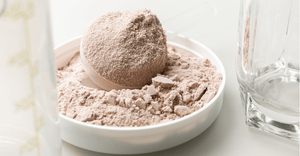Caffeine Anhydrous: What It Is, Benefits, Safety & More
What Is Caffeine Anhydrous?
Caffeine, a naturally occurring stimulant found in plants like coffee, tea, and cacao beans (from which chocolate is made), can also be artificially synthesized in laboratories. (1) It is widely consumed for its ability to activate the central nervous system, providing a surge of energy and mental alertness. Caffeine anhydrous, a highly refined form of caffeine, offers a concentrated dose of energy in a compact form.
What's The Difference Between Caffeine Anhydrous and Caffeine?
A majority of the adult population in the United States regularly ingests caffeine as part of their daily routine. Surveys indicate up to 85% of adults consume caffeinated drinks or foods every day. (1) For most consumers, daily caffeine intake averages around 135 milligrams - the equivalent amount found in a standard 12-ounce cup of coffee.
Unlike coffee beans or tea leaves, which contain caffeine diluted in plant matter, caffeine anhydrous is pure, concentrated caffeine with the water removed. (2) This concentrated form allows for a much higher caffeine content per serving, making it significantly more potent than traditional caffeine sources.
The Benefits Of Caffeine Anhydrous
Caffeine is a widely embraced performance booster among athletes of various skill levels. The science behind caffeine's performance-boosting effects dates back to 1907, when the first study on the topic was published. (3) Since then, researchers have extensively studied caffeine, and the evidence overwhelmingly supports its ability to enhance athletic performance.
According to the International Society of Sports Nutrition's position statement, low to moderate doses of caffeine anhydrous supplements enhance performance more effectively as a pre-workout stimulant compared to caffeine from coffee. (4) That's why you'll find that caffeine anhydrous is often added to pre workout supplements.
Caffeine Anhydrous for Sprinting
Athletes and fitness enthusiasts often seek ways to enhance their performance and push their bodies to the limit. Researchers have investigated the potential of caffeine anhydrous and coffee to improve performance in intense short-burst exercises like sprinting. (5)
In a recent study, researchers analyzed the effects of caffeine anhydrous and coffee on the performance of athletes during repeated sprints. (5) They found that those who consumed caffeine anhydrous before the sprints showed significant improvements in their first sprint time. This suggests that caffeine anhydrous can provide an immediate energy boost and enhance performance at the start of a series of intense exercises.
The study also revealed that athletes who consumed caffeine anhydrous or coffee before the sprints experienced less decline in speed and power during subsequent sprints compared to the placebo group. (5) This indicates that caffeine can help counteract fatigue and maintain performance levels throughout a series of repetitive explosive movements.
Caffeine anhydrous for resistance training
Scientists looked at how consuming coffee or taking caffeine anhydrous capsules affected the performance of strength athletes during high-effort compound lifts. (6) Nine weightlifters participated in five sessions testing their squatting and bench pressing abilities.
In each workout, the men repeatedly lifted 60% of their one-rep max weights until their muscles could no longer perform. (6) They were randomly given four different caffeine conditions: decaffeinated coffee, regular brewed coffee, isolated caffeine anhydrous, and decaffeinated coffee combined with caffeine anhydrous.
Despite feeling equally tired across all treatments, both caffeinated coffee and decaf coffee plus caffeine anhydrous enabled the men to lift significantly more total weight during a squat workout compared to placebo, decaffeinated coffee alone, or caffeine anhydrous alone. (6)
The heaviest cumulative weight lifted during a squat was achieved after taking decaffeinated coffee plus caffeine anhydrous capsules. (6) This suggests that combining decaf coffee with caffeine anhydrous sources may maximize muscular endurance gains during intense lower body strength training.
Caffeine Anhydrous Side Effects
When you consume caffeine, it can cause a short-term increase in your blood pressure. (1) This is more noticeable for people who are not used to caffeine or who consume it in high doses.
High caffeine intake can lead to feelings of nervousness, also known as the jitters. It can also make it harder to fall asleep, especially if consumed later in the day.
Caffeine withdrawal symptoms
If you're a regular caffeine consumer and suddenly stop, you may experience withdrawal symptoms. (1) These typically peak within the first 48 hours of withdrawal and can include headaches, fatigue, irritability, and sadness.
Symptoms of Caffeine Overdose
Consuming extremely high amounts of caffeine, typically 1200 milligrams or more, can lead to a range of unpleasant and even dangerous symptoms, including: (1)
-
Restlessness
-
Intense anxiety
-
High blood pressure
-
Irregular heartbeats known as palpitations
Because it contains caffeine in a condensed form, caffeine anhydrous does carry a higher risk of overdose. (6) To avoid adverse effects, it is important to moderate consumption and stay within the recommended daily limit of 400 mg. (7)
Frequently Asked Questions About Caffeine Anhydrous
Is caffeine anhydrous the same as caffeine?
Caffeine naturally occurs in liquid form in beverages such as coffee and tea. On the flip side, caffeine anhydrous is a dehydrated version produced under laboratory conditions that packs a more concentrated punch. While this intensifies its impact and potential benefit in athletic competitions, it also increases the likelihood of side effects.
Who shouldn't take caffeine anhydrous?
Caffeine anhydrous should be avoided in people who cannot tolerate other forms of caffeine, such as coffee and black tea. People who have known heart disease or blood vessel disease should avoid caffeine anhydrous, as well.
If you suffer from anxiety, insomnia, are having heart palpitations or chest pain, or there is any question about your heart status or ability to tolerate intense exercise, it is important to consult with a licensed medical provider before taking caffeine anhydrous supplements. You can also look into supplements like caffeine free pre workouts.
How long does caffeine anhydrous last?
On average, it takes about 5 hours for a healthy person to eliminate half of the caffeine they consume. (8) However, this can vary significantly, with caffeine lingering anywhere from 1.5 to 9.5 hours in different individuals.
The rate at which caffeine is broken down can be influenced by genetic differences as well as things like your health, habits, and environment. For example, being pregnant, overweight, taking birth control pills, smoking, or living at high altitudes can affect how fast your body breaks down caffeine. (8)
Is caffeine anhydrous safe?
In general, caffeine anhydrous is safe for most healthy individuals who do not have problems drinking coffee. In fact, some of the stomach upset caused by the acid content of coffee can be avoided by taking caffeine anhydrous. However, due to its concentrated nature it does carry a higher risk of overdose. (6)
The latest research confirms that most healthy adults can safely take up to 400 milligrams of caffeine daily without adverse health effects. (7) This aligns with previous advice that moderate caffeine intake is generally safe for most people.
However, further studies suggest that women planning or able to become pregnant, as well as young children, may be more sensitive to caffeine's effects. (7) For these groups, optimal daily caffeine intake may be lower than what is considered safe for men and older adults.
The Bottom Line
Overall, for most healthy adult athletes, caffeine anhydrous can be an effective performance enhancing supplement at mild to moderate dosages. It’s a key ingredient often found in High Stim Pre-Workouts, known for providing an extra boost in energy and focus. Remember that different people can respond in different ways to supplements, so it is important to pay attention to how your body responds to caffeine anhydrous.
If you have any concerns about taking it, please discuss them with your licensed medical provider beforehand.
References
-
Walter K. Caffeine and health. JAMA. 2022 Feb 15;327(7):693-693. https://jamanetwork.com/journals/jama/fullarticle/2789026
-
Allan MC, Owens B, Mauer LJ. Relative humidity–temperature transition boundaries for anhydrous β‐caffeine and caffeine hydrate crystalline forms. Journal of food science. 2020 Jun;85(6):1815-26. https://ift.onlinelibrary.wiley.com/doi/full/10.1111/1750-3841.15114
-
Pickering C, Grgic J. Caffeine and exercise: what next?. Sports Medicine. 2019 Jul 1;49:1007-30. https://link.springer.com/article/10.1007/s40279-019-01101-0
-
Goldstein ER, Ziegenfuss T, Kalman D, Kreider R, Campbell B, Wilborn C, Taylor L, Willoughby D, Stout J, Graves BS, Wildman R. International society of sports nutrition position stand: caffeine and performance. Journal of the International Society of Sports Nutrition. 2010 Dec;7(1):1-5. https://www.ncbi.nlm.nih.gov/pmc/articles/PMC2824625/
-
Trexler ET, Smith-Ryan AE, Roelofs EJ, Hirsch KR, Mock MG. Effects of coffee and caffeine anhydrous on strength and sprint performance. European journal of sport science. 2016 Aug 17;16(6):702-10. https://www.ncbi.nlm.nih.gov/pmc/articles/PMC4803635/
-
Richardson DL, Clarke ND. Effect of coffee and caffeine ingestion on resistance exercise performance. Journal of strength and conditioning research. 2016 Oct 1;30(10):2892-900. https://journals.lww.com/nsca-jscr/fulltext/2016/10000/effect_of_coffee_and_caffeine_ingestion_on.27.aspx
-
Temple JL, Bernard C, Lipshultz SE, Czachor JD, Westphal JA, Mestre MA. The safety of ingested caffeine: a comprehensive review. Frontiers in psychiatry. 2017 May 26;8:80. https://www.ncbi.nlm.nih.gov/pmc/articles/PMC5445139/
-
Institute of Medicine (US) Committee on Military Nutrition Research. Pharmacology of Caffeine. National Library of Medicine. Published 2014. https://www.ncbi.nlm.nih.gov/books/NBK223808/













Leave a comment